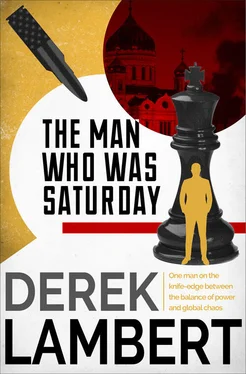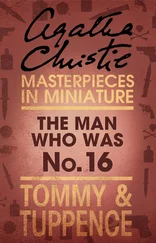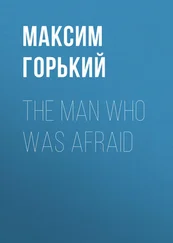He compared her effort with a printed map; it wasn’t much better. Cars swooped past on the avenue, phantom-quick in the moonlight. Across the street a dewlap of snow hung from an old wooden house, one of the few left in this area, old teeth among new dentures.
Why had she invited him to the Women’s Day party? There were a number of possibilities, most of them unwelcome; those that were welcome were unlikely.
Why had he sent her the mimosa? Easier. She was an injection of impetuous youth into the Institute, that fount of futile endeavour, and he wanted to share it. (The defectors reminded him of Dickensian clerks.)
Apartment block 33. There it was on the insect trail. He read the name of the side street under the dewlap of snow. Raskovoj. He was almost there.
The block was white and square with a children’s playground and thinning lawns scattered with a dandruff of snow. There were several notices telling tenants what they should not do.
Calder took the elevator to the fourth floor. Party sounds came from the end of a long corridor that smelled of disinfectant. No. 41, that was where the action was.
Katerina opened the door. She was wearing a black dress cut provocatively but not shamelessly low, Baltic, probably, or one of Zaitsev’s specials which never reached the stores. Her shoulder-length hair had been brushed until it shone blue-black. She wore an amber necklace, almost certainly Baltic, and her grey eyes challenged.
For one disturbing moment Calder saw himself through her eyes. Ageing – forty if he was a day. (He was thirty-eight). Tall and dark and defeated.
‘Comrade Calder, come in.’
He handed her a bottle of pink champagne and walked into Baccanalia.
Rugs had been drawn back from the parquet flooring of the sitting room, dark lacquered furniture pushed flush with the walls. Television, potted plants and assorted chinaware were on high ground out of harm’s way, a bed was doubling up as a couch. Guests crowded the small arena expansively.
‘Can I get you a drink?’
Her English was almost perfect. Although he spoke near-perfect Russian he answered her in English. ‘Are you sure you’ve got enough?’
The table at the end of the room was a distillery. A dozen different vodkas, Stolichnaya, Starka, Russkaya, Yubileinaya, lemon, pepper, hunter’s – Kreiber’s tipple, Calder remembered – caraway, the liquid gunpowder known as animal killer, and a few bottles of moonshine. The firewaters took pride of place. Among the other ranks were Georgian wines and Armenian brandies, Zhigulovsky beer, mineral waters, Limonad and the Soviet Coke, Sayani.
She smiled back at him, the smile at the funeral. ‘I think we can manage.’
‘Vodka then. Yubileinaya.’
‘You’re a connoisseur.’ She poured him a shot of vodka and a glass of mineral water and pointed at the zakuski . ‘You have to eat or the vodka burns holes in your stomach.’
Calder inspected the snacks. Glistening mounds of black, golden and red caviar, slices of smoked salmon, pickled mushrooms, gherkins, blinis, salamis and salads tossed with sour cream, brown and black bread.
He selected a couple of gherkins, tossed back the vodka, drank some mineral water and snapped his teeth into a gherkin.
‘You’ve done that before,’ she said.
‘Many times.’
‘We have a saying that drinking is the joy of Russia.’ She drank some white wine.
‘Then everyone must be very happy.’
‘It’s also a problem,’ she said. ‘Crime, absenteeism, divorce – drinking is usually the culprit. Even children in the kindergartens have been found drinking alcohol.’ She poured him another shot of vodka.
Calder noticed a stocky man, black hair needled with grey, pushing his way through the throng towards them. He skirted a poet tearfully reciting, stepped over two guests arm-wrestling on the floor and stopped beside Katerina. He carried himself like a soldier.
Katerina introduced him as her step-father. He clasped Calder’s hand and crushed it. ‘My name’s Alexander,’ he announced in Russian. ‘Sasha to you. My home is your home and now you must drink or else I shall be offended.’ He laughed hugely. ‘And now a toast. Silence!’ He waited until the only sound was the sobbing of the poet. Raising his glass he proposed a toast: ‘To Anglo-Soviet friendship and our guest from the United States.’
For a frozen moment everyone stared at Calder. He sensed no hostility in the concentrated gaze. But what was all this about? He had left America five years ago.
The stares dissolved, heads tilted. There was some scattered applause.
Sasha tapped his throat with one finger. ‘Pah, it is good to drink is it not, Gaspadeen Calder?’ He refilled their glasses with Yubileinaya. ‘Where do you live in America? I have only been to New York. With the choir, you understand.’
‘Sasha was in the Red Army Choir,’ Katerina explained and, turning her back to her step-father for a moment, whispered: ‘I didn’t tell them who you are.’
‘Boston,’ Calder said.
‘Ah. I pahked my cah in Hahvahd Yahd. How is that?’
‘Spoken like a true Bostonian,’ Calder said in Russian. The vodka was beginning to reach his socks. He smeared caviar on a finger of toast and ate it.
‘Sadly I had to return from New York before I could visit anywhere else. There was, ah, a little trouble ….’ Sasha winked theatrically. ‘But my voice stayed with me. Later I will sing to you.’
Katerina said: ‘The kitchen first. Have you forgotten what day it is?’
‘Ah, the most terrible day of the year. But if we don’t play their little game, Gaspadeen Calder, then we shall be denied our creature comforts for the other 364 days of the year.’ He winked again, with the other eye this time. ‘Isn’t that right, dochka? ’ He pinched Katerina’s cheek and thrust his way back to the kitchen.
Katerina sighed. ‘Another male chauvinist.’
Beside them the arm-wrestlers, hands locked, veins bulging from their necks, grunted. In another corner a young man with long pale hair began to strum a guitar.
‘So I’m just visiting, huh?’
‘I couldn’t say you were a defector. My step-father wouldn’t have let you in. And not a single person in this room would have raised his glass to you.’
‘And you?’
Katerina sipped her wine. ‘You won’t find anyone in Russia who has much time for someone who ….’
‘Betrayed their country?’
She shrugged. ‘Deserted.’
‘Then why did you invite me here?’ He held up one hand. ‘Don’t tell me – you felt sorry for me.’
‘Because you worry me. You know, you left the West because you were disillusioned. That was the reason, wasn’t it? And now you seem to be disillusioned with the Soviet Union. I thought I’d show you what life here can be like.’
Calder gestured with his empty glass around the room. ‘Your friends certainly know how to enjoy themselves.’ It was the first time he had been inside a home like this; all the other invitations had been arranged – safe, tame, dull Communists. ‘It’s a bash.’
‘Would you find people enjoying themselves like this in Boston?’
Here we go, he thought, the equation. There was no escape from it. He said: ‘Sure you would.’ In his shared apartment near Fenway Park in his long-ago student days, for instance.
The arm of one of the wrestlers almost touched the floor, then sprang back again. The poet, to whom no one was listening, petulantly threw his glass against the wall.
A small woman with dimples and bright brown eyes said: ‘Is this the gentleman you were telling me about, Kata?’
Katerina introduced her mother.
Her mother said: ‘His glass is empty, Kata. Fill it with the demon. And don’t forget to eat, Gaspadeen Calder. We have a saying in the Soviet Union. Food on an empty stomach makes a full grave.’
Читать дальше












